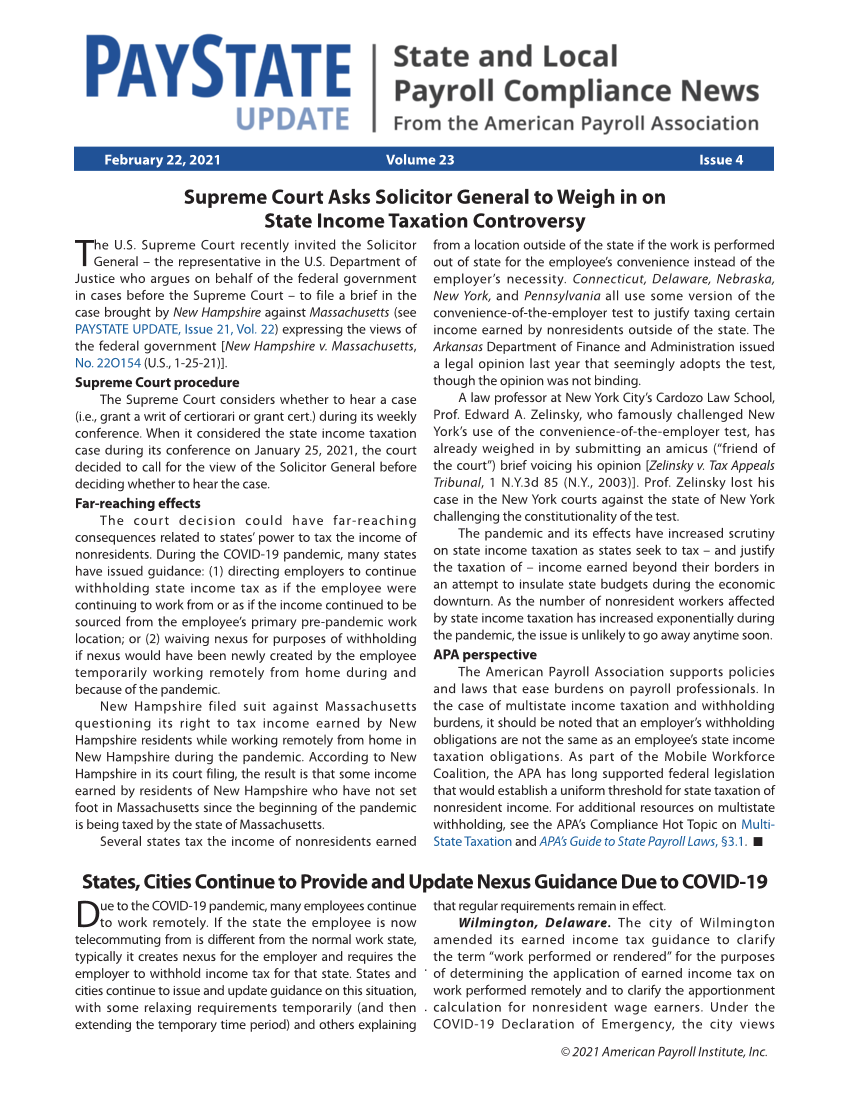© 2021 American Payroll Institute, Inc. Supreme Court Asks Solicitor General to Weigh in on State Income Taxation Controversy TGeneral he U.S. Supreme Court recently invited the Solicitor – the representative in the U.S. Department of Justice who argues on behalf of the federal government in cases before the Supreme Court – to file a brief in the case brought by New Hampshire against Massachusetts (see PAYSTATE UPDATE, Issue 21, Vol. 22) expressing the views of the federal government [New Hampshire v. Massachusetts, No. 22O154 (U.S., 1-25-21)]. Supreme Court procedure The Supreme Court considers whether to hear a case (i.e., grant a writ of certiorari or grant cert.) during its weekly conference. When it considered the state income taxation case during its conference on January 25, 2021, the court decided to call for the view of the Solicitor General before deciding whether to hear the case. Far-reaching effects The court decision could have far-reaching consequences related to states’ power to tax the income of nonresidents. During the COVID-19 pandemic, many states have issued guidance: (1) directing employers to continue withholding state income tax as if the employee were continuing to work from or as if the income continued to be sourced from the employee’s primary pre-pandemic work location or (2) waiving nexus for purposes of withholding if nexus would have been newly created by the employee temporarily working remotely from home during and because of the pandemic. New Hampshire filed suit against Massachusetts questioning its right to tax income earned by New Hampshire residents while working remotely from home in New Hampshire during the pandemic. According to New Hampshire in its court filing, the result is that some income earned by residents of New Hampshire who have not set foot in Massachusetts since the beginning of the pandemic is being taxed by the state of Massachusetts. Several states tax the income of nonresidents earned from a location outside of the state if the work is performed out of state for the employee’s convenience instead of the employer’s necessity. Connecticut, Delaware, Nebraska, New York, and Pennsylvania all use some version of the convenience-of-the-employer test to justify taxing certain income earned by nonresidents outside of the state. The Arkansas Department of Finance and Administration issued a legal opinion last year that seemingly adopts the test, though the opinion was not binding. A law professor at New York City’s Cardozo Law School, Prof. Edward A. Zelinsky, who famously challenged New York’s use of the convenience-of-the-employer test, has already weighed in by submitting an amicus (“friend of the court”) brief voicing his opinion [Zelinsky v. Tax Appeals Tribunal, 1 N.Y.3d 85 (N.Y., 2003)]. Prof. Zelinsky lost his case in the New York courts against the state of New York challenging the constitutionality of the test. The pandemic and its effects have increased scrutiny on state income taxation as states seek to tax – and justify the taxation of – income earned beyond their borders in an attempt to insulate state budgets during the economic downturn. As the number of nonresident workers affected by state income taxation has increased exponentially during the pandemic, the issue is unlikely to go away anytime soon. APA perspective The American Payroll Association supports policies and laws that ease burdens on payroll professionals. In the case of multistate income taxation and withholding burdens, it should be noted that an employer’s withholding obligations are not the same as an employee’s state income taxation obligations. As part of the Mobile Workforce Coalition, the APA has long supported federal legislation that would establish a uniform threshold for state taxation of nonresident income. For additional resources on multistate withholding, see the APA’s Compliance Hot Topic on Multi- State Taxation and APA’s Guide to State Payroll Laws, §3.1. States, Cities Continue to Provide and Update Nexus Guidance Due to COVID-19 Dto ue to the COVID-19 pandemic, many employees continue work remotely. If the state the employee is now telecommuting from is different from the normal work state, typically it creates nexus for the employer and requires the employer to withhold income tax for that state. States and cities continue to issue and update guidance on this situation, with some relaxing requirements temporarily (and then extending the temporary time period) and others explaining that regular requirements remain in effect. Wilmington, Delaware. The city of Wilmington amended its earned income tax guidance to clarify the term “work performed or rendered” for the purposes of determining the application of earned income tax on work performed remotely and to clarify the apportionment calculation for nonresident wage earners. Under the COVID-19 Declaration of Emergency, the city views February 22, 2021 Volume 23 Issue 4
Printed for: PayrollOrg Bookshelf © 2024 American Payroll Institute, Inc. All Rights reserved. From: PayrollOrg Digital Publications (bookshelf.payroll.org)







